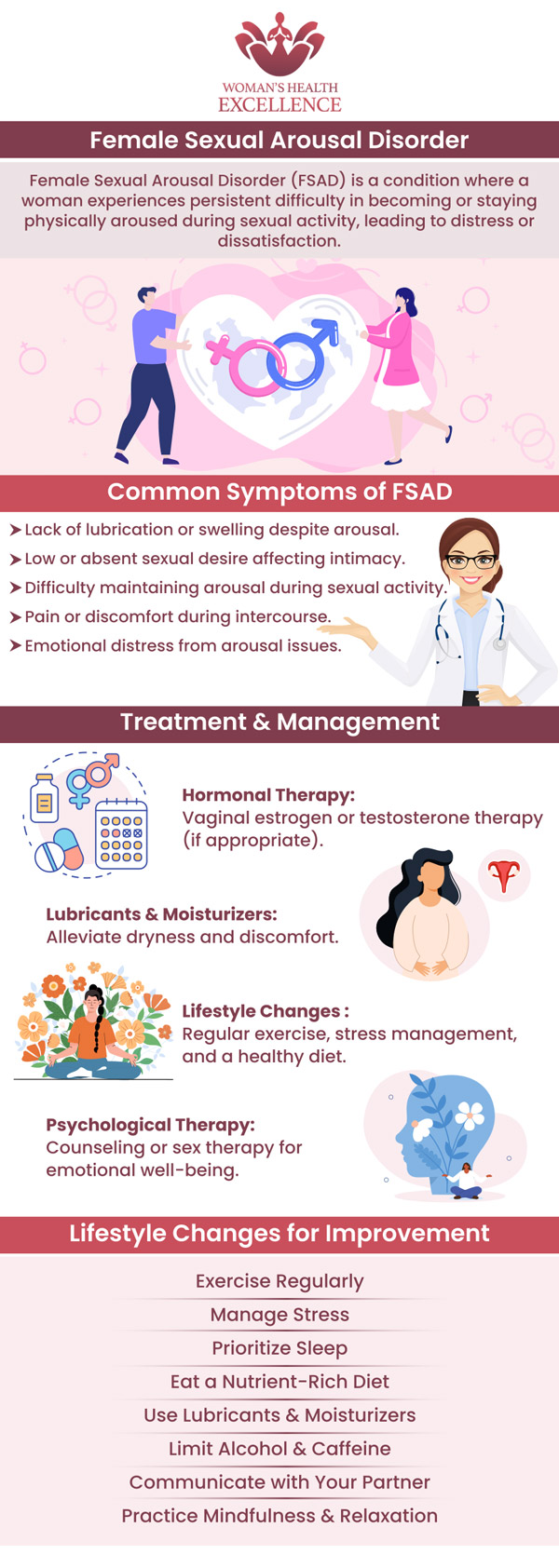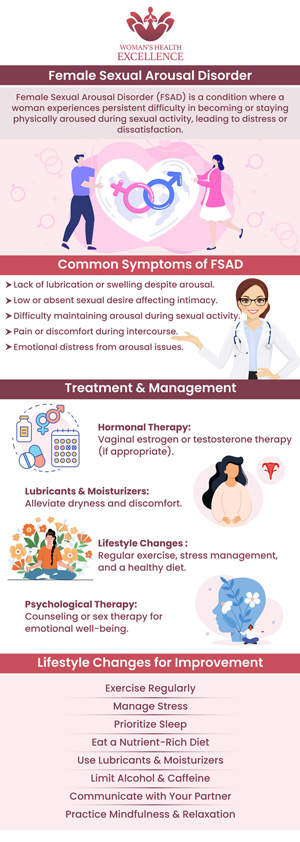What Is Female Sexual Arousal Disorder?
Dr. Prema Kothandaraman, along with her dedicated team at The OB-GYN and Incontinence Center, provides compassionate and specialized care for women experiencing FSAD. We offer personalized solutions to address concerns related to sexual health. Schedule a consultation to explore options and regain a fulfilling and satisfying intimate life. For more information, contact us today or book an appointment online. We have convenient locations to serve you in Arcadia, and Glendale, CA.




Table of Contents:
What causes female sexual arousal disorder?
What helps with female sexual arousal?
What are the symptoms of female sexual interest arousal disorder?
At The OB-GYN & Incontinence Center, we understand that female sexual health is a complex matter encompassing various physiological and psychological aspects. One condition we frequently encounter is Female Sexual Arousal Disorder (FSAD), a condition characterized by a persistent or recurrent inability to attain, or maintain the necessary sexual excitement that causes personal distress. This distress may manifest as a lack of subjective excitement, or genital or other bodily responses. Our dedicated team of professionals is highly experienced in diagnosing and managing FSAD, providing empathetic, comprehensive care to help women overcome this condition.
The causes of Female Sexual Arousal Disorder (FSAD) can be multifaceted and typically involve a combination of physical and psychological factors. On the physical side, underlying health conditions such as endocrine disorders, hormonal imbalances, or cardiovascular diseases can lead to FSAD. Certain medications, especially those affecting the hormonal or cardiovascular system, can also contribute to the disorder. Menopausal changes, involving a decline in estrogen levels, can lead to diminished sexual arousal as well.
Meanwhile, psychological factors are equally important in understanding FSAD. These can include mental health conditions such as depression or anxiety, negative sexual experiences, or deep-seated beliefs about sex stemming from cultural or religious conditioning. Stress and issues within a relationship can also create a psychological barrier to sexual arousal. It’s crucial to note that these causes often interplay in complex ways, and addressing FSAD usually requires a multifaceted, patient-specific approach.
Addressing Female Sexual Arousal Disorder (FSAD) often involves a multi-pronged approach, combining medical treatment with psychological therapy and lifestyle changes. Medication could include hormone therapy, particularly in post-menopausal women, to address any hormonal imbalances that may be contributing to FSAD. There are also FDA-approved drugs specifically designed to enhance female sexual arousal by altering certain chemical responses in the brain. However, it’s important to discuss potential side effects and understand that medication may not be a suitable or complete solution for everyone.
In addition to medical treatments, psychological counseling or sex therapy can be highly effective. A qualified therapist can help address any underlying psychological issues such as anxiety, depression, or negative perceptions about sex. They can also provide strategies for improving communication within a relationship, which can be tremendously beneficial in overcoming FSAD. Lifestyle factors like regular physical exercise, maintaining a balanced diet, and reducing alcohol and nicotine intake can positively affect overall health, including sexual health. It’s essential to understand that every woman’s experience with FSAD is unique, and the most effective treatment will vary accordingly. Therefore, a tailored approach that encompasses various therapeutic strategies is often the most successful in managing FSAD.
The symptoms of Female Sexual Interest/Arousal Disorder (FSIAD) can vary greatly among women but generally revolve around a reduced interest in sexual activity. This could manifest as diminished sexual thoughts or fantasies, lack of or decreased initiation of sexual activity, and typically not being responsive to a partner’s attempts to initiate. Physically, a woman may experience a lack of or significantly reduced sexual excitement or pleasure in almost all or all sexual encounters. She might also have minimal or no genital or non-genital sensations during sexual activity. It’s important to note that these symptoms must be present for at least six months and cause significant distress to the individual, and they should not be better accounted for by a nonsexual mental disorder, severe relationship distress, or other significant stressors to be diagnosed as FSIAD.
At The OB-GYN & Incontinence Center, we firmly believe that every woman deserves a fulfilling sexual life and the freedom to express her sexuality without distress or discomfort. If you’re experiencing symptoms associated with Female Sexual Interest/Arousal Disorder (FSIAD) or if you have any concerns about your sexual health, we encourage you to reach out. Our compassionate and expert team is ready to assist you on your journey towards improved sexual health. Don’t hesitate to call us or book an appointment online today – together, we can develop a tailored treatment approach that best suits your individual needs and lifestyle.
Regain control and confidence in your intimate life with Dr. Prema Kothandaraman and her dedicated team at The OB-GYN and Incontinence Center. Our compassionate and specialized care for (FSAD) focuses on your unique needs. Schedule a consultation to explore personalized solutions, and let us guide you toward a more fulfilling and satisfying intimate experience. For more information, contact us today or visit our clinic. We have convenient locations to serve you in Arcadia, and Glendale, CA. We serve patients from Arcadia CA, Glendale CA, Monrovia CA, Pasadena CA, Los Angeles CA, Burbank CA, and surrounding areas.


Additional Services You May Need
▸ Urogynecology
▸ Minimally Invasive Gynecology
▸ Monalisa & Medical Aesthetics
▸ Bioidentical Hormone Replacement Therapy
▸ Urinary Incontinence
▸ Pelvic Organ Prolapse
▸ Painful Bladder
▸ Urinary Tract Infection
▸ Genitourinary Syndrome of Menopause
▸ Female Sexual Dysfunction
▸ Urinary Retention
▸ Vaginal Laxity & Prolapse
▸ Postpartum Pelvic Floor Problems
▸ PCOD
▸ Bladder Prolapse Repair
▸ Urgent PC
▸ Fibroids
▸ Excessive Bleeding
▸ Pelvic Pain
▸ Birth Control & IUD
▸ Vaginal & Pelvic Infection
▸ Monalisa Touch
▸ STD
▸ TempsureVitalia
▸ Biote Pellet Therapy
▸ Topical BHRT
▸ Flexsure
▸ Rectal Prolapse Repair
▸ Tempsure ENVI
▸ Minimally Invasive Pelvic Surgery for Incontinence



